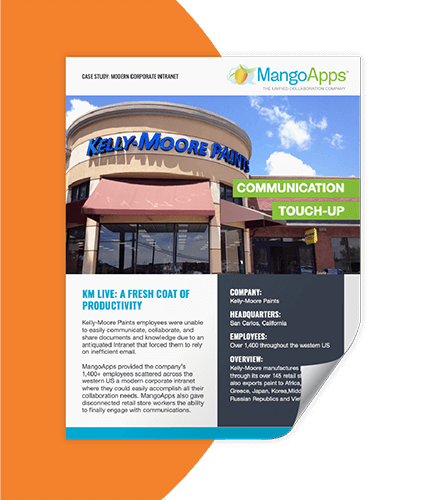In the world of retail, long hours, demanding customers, and constant pressure to meet targets are the norm. As a result, burnout is a prevalent and concerning issue. Burnout not only affects the well-being of retail associates but also impacts the overall success of businesses.
In this blog, we’ll explore strategies to reduce burnout among retail associates and create a healthier work environment. We will also touch on how the right communication tools for retail can help.
The Burnout Challenge in Retail
Let’s dive into 10 strategies that can help reduce burnout among retail associates:
1) Establish Clear Expectations and Work-Life Boundaries
In many companies, the real root of issues with staff burnout is some combination of common retail communication problems. These are further exacerbated by irregular schedules and lack of clearly established expectations and boundaries.
To combat this, managers should strive to craft schedules that are both predictable and accommodating. Retail associates should know well in advance when they are expected to work. This allows them to establish firm boundaries for their off-hours.
Managers can also create a system where workers can swap shifts with each other (with managerial oversight). If done well, this provides added flexibility while maintaining operational consistency. By doing this, retail workers are better able to enjoy their personal lives and manage stress. This means they’ll come to work more focused and recharged.
2) Invest in Training and Skill Development
Feeling ill-equipped to handle job responsibilities is a leading cause of burnout. Retail associates need consistent, in-depth training sessions that go beyond basic orientation. Such programs should cover the intricacies of customer service, such as handling difficult clients, the POS system and inventory. You might even address soft skills like conflict resolution and stress management.
Continuous learning programs, maybe even incorporating e-learning modules for flexibility, can help associates grow in their roles and stay engaged. This can significantly lower the risk of burnout.
3) Empowerment through Decision-Making
The feeling of powerlessness is a significant contributor to burnout. Empowering retail associates to make choices about customer service, inventory, or even merchandising can give them a sense of control and ownership over their work. Managers can establish guidelines and parameters within which employees can operate autonomously.
This approach not only minimizes the burden on managerial staff but also boosts employee engagement and satisfaction. Empowered employees feel more connected to their roles and the organization, reducing the chances of feeling burned out.
4) Recognition and Rewards Programs
Feeling unrecognized in the workplace is a surefire route to disengagement and eventually, burnout. Companies should establish robust recognition programs that celebrate both big and small wins. These can be as elaborate as quarterly awards ceremonies, or as simple as a daily shoutout during team meetings.
Monetary incentives, gift cards, or extra paid time off are other great ways to show appreciation. The idea is to create a culture where hard work is consistently acknowledged, making employees feel valued and less prone to burnout.
5) Foster a Supportive Work Environment
A toxic or isolating work environment can significantly contribute to employee burnout. To counter this, retail environments should promote a culture of inclusivity, teamwork, and mutual support. Regular team-building exercises can strengthen interpersonal relationships. Open-door policies and anonymous suggestion boxes can make associates feel their opinions are valued.
Managers should be trained to identify signs of workplace stress and to offer appropriate support, either directly or by facilitating access to mental health resources.
6) Encourage Regular Breaks
Long hours of repetitive tasks can quickly lead to physical and emotional fatigue, a stepping stone to burnout. Promoting regular breaks, even if they are just 5-10 minutes long, can have a profound impact on well-being. Encourage associates to step outside for fresh air, have a healthy snack, or engage in quick physical exercises like stretching.
Rotating tasks among associates can also prevent the monotony and physical strain that lead to burnout.
7) Stress Management and Well-Being Programs
High-stress levels are often an early warning sign of impending burnout. Retail organizations should consider offering stress management solutions like in-house workshops or subsidized memberships to wellness apps that offer guided meditations and mindfulness exercises.
Employee wellness programs could also include access to fitness centers or partnerships with local gyms, nutritional counseling, or even bi-weekly or monthly group yoga or meditation sessions. All these initiatives help create a holistic approach to employee well-being, significantly reducing stress and the risk of burnout.
8) Flexibility and Work-Life Balance
Traditional working hours don’t fit everyone’s lifestyle, especially in retail. Where possible, offering flexible work schedules can be a game-changer. Consider implementing different shifts, part-time options, or even work-from-home days for roles that allow for it. These changes show empathy toward associates’ personal lives and can result in increased productivity and decreased burnout.
9) Regular Check-Ins and Feedback
Periodic one-on-one meetings between managers and associates are essential for more than just reviewing performance metrics. They serve as a confidential setting where employees can voice their concerns, frustrations, or needs without fear of judgment.
These regular check-ins can also include wellness assessments, goal-setting discussions, and constructive feedback, all aimed at identifying and addressing early signs of burnout. Both parties benefit from these interactions, leading to a healthier and more proactive work environment.
It is always good to also do these sorts of efforts at scale with polls or surveys—see our guide to the most valuable retail staff survey questions for some ideas to get you started.
10) Monitor Workload and Delegate Effectively
A key reason many retail associates experience burnout is being overloaded with tasks that are both numerous and time-sensitive. Effective workload management involves regular audits of task lists, clearly defined roles, and streamlined delegation procedures.
Managers should ensure that workloads are spread out evenly among the team and can use project management tools to track task progress. Such systems create transparency and accountability, helping to balance the demands of the job with the emotional and physical well-being of the associates.

Enabling frontline retail employees at Kelly-Moore Paints
Learn how Kelly-Moore Paints enabled its frontline retail workforce with a modern employee app.
How A Modern Intranet Can Reduce Retail Burnout
A modern intranet plays a pivotal role in alleviating burnout among retail associates. By providing a centralized platform for communication, training, and resource accessibility, it streamlines processes and reduces the burden of information overload.
Retail associates can access critical updates, training materials, and shift schedules with ease, eliminating the need for constant searching and follow-ups. Moreover, the ability to customize their intranet dashboards ensures that associates see information that is directly relevant to their roles, enhancing productivity and reducing unnecessary stress.
Additionally, the sense of community fostered by features like recognition boards and feedback channels can boost morale, contributing to a more positive and supportive work environment.
Ultimately, a modern intranet empowers retail associates with the tools and resources they need, reducing burnout by simplifying tasks and promoting a healthier work-life balance. Couple the right platform with a well-crafted retail communication strategy, and the results will speak for themselves.
MangoApps
MangoApps stands out as an excellent choice for a modern intranet in the retail sector. Its intuitive platform and mobile app empower retail associates to access real-time updates, training resources, and essential information effortlessly, fostering a more informed and engaged workforce.
MangoApps’ robust communication features, including instant messaging and discussion forums, promote collaboration among associates, enhancing teamwork and problem-solving capabilities. Additionally, its user-friendly interface ensures that retail associates can navigate the platform with ease, even during busy shifts.
MangoApps not only streamlines internal communication but also nurtures a sense of community and connection among retail teams, making it a valuable asset for any retail business striving to reduce burnout and excel in the competitive retail landscape. To learn more, read customer stories from A.S. Watson and Superdrug, or schedule a demo with our team.







